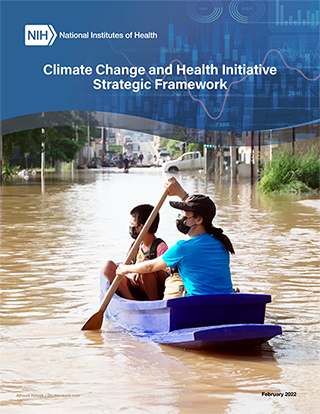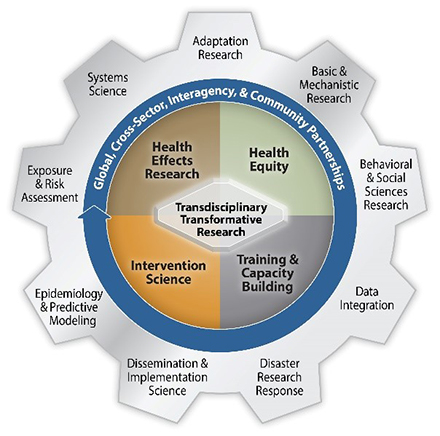By Megan Avakian

From adverse effects on heart, lung, and mental health to changes in the spread of infectious disease, the threats of climate change on human health are so diverse and complex that addressing them will require a unified, NIH-wide approach. That's the premise behind a new NIH Climate Change and Health (CCH) Initiative to advance scientific knowledge of climate-related health threats and boost climate resilience in individuals, communities, and nations around the world.
"Climate change and extreme weather touch upon many of the diseases, illness, and systems that are being studied across NIH, so each institute has an interest in the issue," said NIEHS Senior Medical Advisor Aubrey Miller, M.D. Miller co-chairs the CCH Working Group alongside Joshua Rosenthal, Ph.D., a senior scientist from NIH Fogarty International Center. Made up of staff from across NIH, the group has worked for nearly a year to develop a strategy to expand and enhance the research needed to tackle climate change and health issues. A CCH Executive Committee, made up of directors from seven NIH institutes and centers (ICs) provides ongoing input, oversight, and leadership for the effort. NIEHS and National Toxicology Program Director, Rick Woychik, Ph.D., chairs the Executive Committee.
The result of this collaboration is a strategic research framework and agenda (205KB) that was presented and approved during a special session of the National Advisory Environmental Health Sciences Council , November 29, 2021.
The Making of a Research Initiative
CCH Initiative Goals, Objectives
The CCH Initiative aims to reduce climate-related health threats across the lifespan and build resilience in individuals, communities, and nations around the world, especially those at highest risk. These goals will be accomplished through the following objectives:
- Identify health risks and optimize benefits from actions of individuals, communities, and populations to mitigate or adapt to climate change.
- Develop the necessary research infrastructure and workforce to enable the generation of timely and relevant knowledge, drawing from the full spectrum of biomedical disciplines.
- Leverage partnerships with other scientific and social disciplines and organizations to achieve the most impactful results.
- Innovate across the research translation continuum to ensure findings are credible, accessible, and actionable for achieving these goals.
A slew of activities and information helped the NIH Working Group identify strengths, needs, and knowledge gaps to build the framework.
NIH issued a Request for Information (RFI) in July 2021 to gather feedback from stakeholders on approaches to enhance climate change and health research. Working Group members reviewed the 184 responses submitted by a range of organization types across six priority areas: innovative research, scientific infrastructure, partnerships, rapid research response capacity, diverse workforce, and translation and dissemination.
An analysis of NIH climate change and health grants awarded between 2011-2020 allowed the Working Group to identify gaps in the research portfolio to help inform and shape future programs. The analysis included 350 grants across 21 NIH ICs, with more than a third coming from NIEHS.
A landscape analysis of U.S. and international organizations funding climate change and health research helped the Working Group identify potential collaborators.
"It's important that we identify interagency and international partner organizations for future communication, coordination, and collaboration of activities, as well as areas where NIH can make unique contributions. We want to be complementary to - not duplicative of - our partners' efforts," said NIEHS Population Health Branch Chief Claudia Thompson, Ph.D., who presented the initiative to council members at the November 2021 meeting.

Four core tenets emerged from the Working Group's efforts:
- Health effects research.
- Health equity.
- Intervention science.
- Training and capacity building.
These tenets form the foundation of a strategic framework that relies on collaboration to move from documenting health effects to designing testable interventions. Those interventions will help communities prepare, adapt, respond, and recover from the impacts of climate change. The goal is to move knowledge about how climate change affects health from research to action - including informing policy at local, regional, and national levels around the world.
Moving Forward
A Crosscutting Example: Heat and Health
To give council members a feel for the crosscutting nature of climate change and health issues, Thompson highlighted the many ways heat can affect health. She noted that extreme heat has been linked to an increased risk of preterm birth, stroke, cardiovascular events, and kidney disease, as well as changes in behavior and the spread of infectious disease.
Developed by the Working Group, the following example research projects can help scientists, communities, and decision makers better understand, prepare for, and mitigate heat-related health effects.
- Mechanistic studies to understand how heat exposures impact cellular systems such as mitochondrial function and oxidative stress.
- Randomized control trials to understand the effectiveness of community cooling spaces to reduce the effects of extreme heat, especially among older adults and pregnant women.
- Developing measures of long-term clinical change in communities of color due to climate change.
- Using computational modeling networks to predict outbreaks of vector borne diseases following changes in temperature or precipitation.
With support from the White House, Congress, the scientific community and the public, NIH has an opportunity to expand its leadership role in climate change and health. As a first step, NIH plans to issue a series of notices of special interest, called NOSIs, to broadly alert the research community of funding opportunities relevant to climate change and health.
Grants made through the NIH small business program will accelerate the development of tools, resources, and approaches to capture the effects of climate change and extreme weather on health and support climate change adaptation and mitigation strategies.
There are also plans to build academic-community partnerships and translational research capacity.
"New teams of scientists from many disciplines including biomedical and population science, climate science, and the social sciences are key to developing the innovative, transdisciplinary, and solutions-driven research needed to improve our understanding of how climate change affects health," said Gwen Collman, Ph.D., NIEHS Senior Advisor and CCH strategic advisor. "Importantly, this research must include community partners."
The Working Group is considering several mechanisms to facilitate this type of transdisciplinary, community-based research, including a future Centers of Excellence program.
In addition to these and other planned extramural funding opportunities, the Working Group is exploring ways to build climate change and health research capacity at the intramural level at NIH.
"This is just the beginning. We will continue to strategize and develop a plan for implementation now and in the future - and we'll do this by addressing the climate crisis with the urgency, foresight, innovation, and collaborative spirit that this challenge requires," said Thompson.
Climate Change and Health From Different Perspectives
In August 2021, the Working Group launched an NIH-wide Climate Change and Health webinar series.
"Through these webinars we've been able to hear different perspectives and learn where different NIH Institutes and Centers climate change and health interests lie," said Trisha Castranio, who manages the NIEHS Global Environmental Health program. "The series is also helping us identify opportunities for collaboration."
Each session is hosted by a different Institute and Center (IC) and features opening remarks from the IC Director about how climate change affects their institute's mission. Presentations and a moderated discussion follow.
- Hosted by the National Heart, Lung, and Blood Institute, the February 22 session will feature Jonathan Samet, M.D, from the Colorado School of Public Health, and Tami Bond, Ph.D., from Colorado State University, who will present their talk, "Climate Change, Air Pollution, and Health: What Lies Ahead (352KB)."
- Hosted by the National Institute on Minority Health and Health Disparities, the February 9 session featured a presentation by Robert Bullard, Ph.D., from Texas Southern University, titled "Why Climate Change Is a Health Threat (351KB)."
- Hosted by the National Institute of Nursing Research, the December 17, 2021 session featured a presentation by Linda McCauley, R.N., Ph.D., from Emory University, titled " Notes From the Field: Pivoting a Research Program to Climate Change ."
- Hosted by the National Institute of Mental Health, the November 2, 2021 session featured a presentation by Eugenia South, M.D. titled " Climate Resilience and Health Equity in Black Neighborhoods: The Case for Urban Nature ."
- Hosted by NIEHS, the August 16, 2021, kickoff session featured presentations by Kris Ebi, Ph.D., from the University of Washington, David Pellow, Ph.D., from the University of California, Santa Barbara, and Kiros Berhane, Ph.D., from Columbia University, titled " Developing a Climate Change and Health Research Agenda for the NIH: Adaptation, Equity, and Big Data ."


